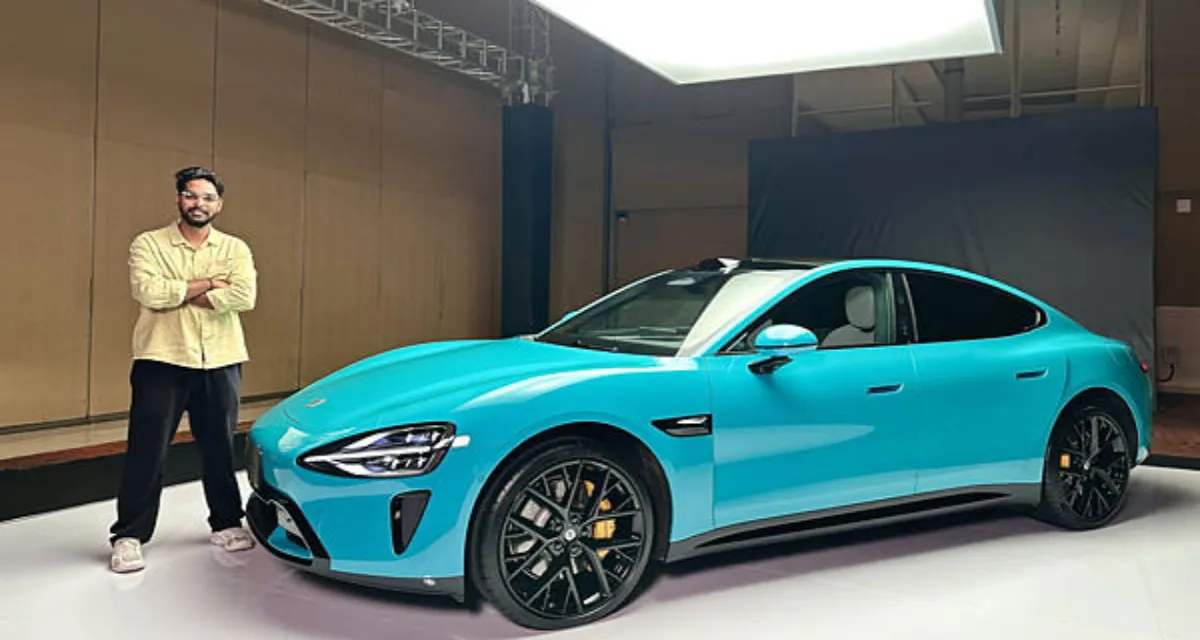

What happens when a tech company ventures into the car business? Remember when Apple ambitiously announced its foray into the electric mobility space? Although the idea of an Apple-made electric car was eventually shelved, another tech giant, Xiaomi, took on the challenge. In 2021, Xiaomi's headquarters in China initiated a plan to develop an EV for the mass market. Just four years later, Xiaomi has successfully launched its first all-electric car, the Xiaomi SU7, a supercar from a company known primarily for smartphones, tablets, and home appliances. The SU7 is a tech-packed marvel on wheels, blending high performance with cutting-edge technology. Currently available exclusively in China, the Xiaomi SU7 has already garnered over 80,000 bookings.
The Xiaomi SU7 is a striking vehicle, drawing inspiration from other luxury cars while maintaining a fresh appeal. Its low-slung stance is reminiscent of Porsche's design language, featuring a sleek front fascia with a dipping nose for enhanced aerodynamic efficiency. The overall design is smooth and curvaceous, contributing to an impressive drag coefficient of just 0.195. Notable design elements include bezel-less ORVMs, flush-fitting door handles with a soft-close function, and an active rear spoiler with three adjustable settings. The SU7 Max variant stands out with 21-inch multi-spoke alloy wheels, Brembo brake callipers, adaptive ride control, and high-performance LED headlamps. The rear section of the car features LED taillamps inspired by Saturn's rings, adding a unique touch to its opulent design. However, one design element that could be improved is the non-retractable LiDAR sensor on the roof, which looks slightly out of place. The SU7 offers 517 liters of boot space and an additional 105-liter frunk, making it as practical as it is stylish.
The Xiaomi SU7 is built on a skateboard platform with an in-house developed chassis, focusing on efficiency, rigidity, and performance. Xiaomi refers to it as a 'Smart Chassis,' featuring a Bosch stability control system with a DPB brake controller, variable damping shock absorbers, an aluminum double-wishbone front suspension, and a five-link independent rear suspension. The car's weight distribution is perfectly balanced at a 50:50 ratio, contributing to a low center of gravity and enhanced driving dynamics.
Inside the Xiaomi SU7, the tech expertise of the brand truly shines. The cabin is spacious, thanks to a platform and battery pack design that doesn't raise the floor excessively. The rear seats offer decent legroom and thigh support, although the sloping roofline and expansive glass roof limit headroom for taller passengers. The seats are ventilated for added comfort, and the rear passengers enjoy a 50W fast wireless charger, a fridge, and two mounts on the back of each front seat for tablet-based rear-seat entertainment. The Xiaomi tablets, once connected, can run the same UI as the main infotainment screen, allowing rear passengers to control all the car's functions.
The centerpiece of the SU7's tech-laden interior is a large 16.1-inch infotainment screen on the dashboard. This display runs on Xiaomi's 'Hyper OS,' the same software found in many of the company's gadgets and home appliances. Over 1,000 Xiaomi products can be connected to the SU7, creating a seamless ecosystem. The infotainment screen controls all vehicle functions, including the air conditioning system, with options for modular-style buttons and additional accessories like small circular displays. The instrument panel features a unique seven-inch screen with a rotating function upon startup, while the 56-inch HUD display projects essential information such as range, navigation, power output, and speed.
In the top-spec Max variant, the Xiaomi SU7 comes loaded with 25 speakers, multiple wireless chargers, three-zone climate control, ambient lighting, a heated steering wheel, powered front seats, a fixed glass roof, a LiDAR-based ADAS system, a 360-degree surround camera with 11 cameras, rear AC vents, Type-C charging ports, and 16 driver assistance features with seven airbags.
The Xiaomi SU7 is offered in three variants in China: Standard, Pro, and Max. The Standard and Pro variants feature a single motor producing 295bhp and 400 Nm of torque. The Max variant, showcased in India, boasts a dual-motor setup generating 670bhp and 838Nm of peak torque. This powertrain propels the SU7 Max from 0 to 100kmph in just 2.78 seconds, with an electronically limited top speed of 265 kph.
The top-spec Max variant is equipped with a 101kWh battery pack, delivering a claimed range of 810 km on a single charge. With a fast charger, the SU7 can achieve a range of up to 510 km in just 15 minutes of charging, making it a serious contender in the electric supercar market.
The Xiaomi SU7 is currently available only in China, retailing at an approximate price of Rs. 25 lakh to Rs. 35 lakh (converted to Indian Rupees). Although Xiaomi has no immediate plans to sell the SU7 outside of China, the Indian market could be a key focus area if the brand decides to expand globally. Considering Xiaomi's aggressive pricing strategy, the SU7 could be priced between Rs. 60 lakh and Rs. 80 lakh in India, including import duties, taxes, and operational costs. Even at this price point, the SU7 would attract attention and could compete with the likes of the BYD Seal, BMW i4, Volvo C40 Recharge, Mercedes-Benz EQB, and Kia EV6. The Xiaomi SU7 is poised to set new trends in the global electric vehicle market, proving that a tech company can indeed create a successful and desirable electric supercar. If only Apple had pursued its dream project of creating an electric car, it could have been a hit, given the brand's global popularity and influence.
Also Read: